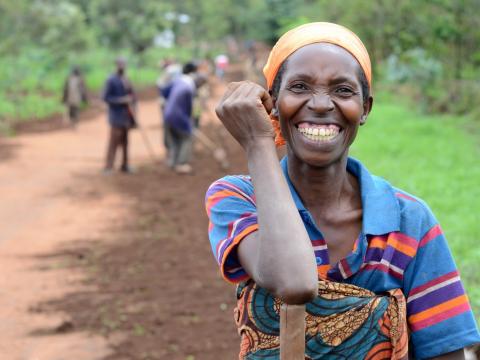What can a woman do with an extra $25 a month?

In Burundi, two out of every three people are living on less than $2 US a day. For mothers, ensuring their children get enough food to eat is often a struggle.
“I was poor. I didn’t even have salt,” says Emmanuela, a 25-year-old mother of three. “We just had a very small piece of land.”
“Most of the time I had no money, no food and no clothes,” adds Marie-Goreth Nicimpaye, a mother of one.
However, that’s now a thing of the past
World Vision saw the need and organized a cash for work programme for mothers with young children, with the World Food Programme’s support.
Participants were tasked with:
- Digging organic composting pits – to later spread on their land to increase soil fertility
- Creating kitchen gardens – to provide vegetables for their families
- Constructing and repairing a road – to enable access to the market
The project, funded by the World Food Programme, lasts seven months and benefited more than 5,700 families who receive the equivalent of $25 US a month for their labour. The injection of extra income is helping families improve their lives.
These are five of the people who benefited from the project and how they used the money:
1. Emmanuela provides her children with three meals a day
“Before it was really hard to provide for the family. We could only eat once a day,” says Emmanuela, a 25-year-old mother of three.
The family’s situation changed after Emmanuela joined the World Vision cash for work programme. Clothes, food and, yes, salt were purchased.
“Now we have porridge for breakfast. And we have lunch and dinner too. We eat cassava bread, beans and vegetables,” Emmanuela says.
“We’ve already made a down payment on another small piece of land and we bought a piglet.”
2. Jeanne purchased a goat and seeds
“I bought a goat, seeds and fertilizer. I spent a little on food, buying maize (corn) and beans,” says Jeanne Butoyi, 20, the mother of one.
3. Marie-Goreth became self-reliant
“My husband is in Tanzania, looking for work. He sends money every two months or so, but if he doesn’t have anything, he sends nothing,” says Marie-Goreth Nicempaye, a mother of one.
Since joining the cash for work programme, Marie Goreth has “bought livestock – a goat, soap and food from the market.”
“I am not relying on the cash my husband sends anymore. I hope the small things I’m buying will help me in the future and that I will not go back to what I was in the past.”
4. Jane and Eric invested in a calf
Eric Nduwayo and his wife Jane Nishimagizwe were floundering as farmers.
After they joined the cash for work programming, “With the first cash we got, we used it for medical treatment. I bought clothes for my wife. We bought fertilizer for our land and purchased bean seeds,” Eric says.
Later, during the second monthly payout, the couple bought a calf – a long term investment the family hopes will produce milk one day and reproduce.
5. Esperance put a down payment on a new piece of land
“The first cash payment I got, I bought fertilizer to increase our crop production. I put a down payment on a small piece of land in the marshland where I can grow crops in the dry season,” says Esperance, a 35-year-old mother of seven children.
“My hope for the future is that the land will provide for my family. Even after I die it will support them.
“I am really thankful for this project. The project helped me secure that piece of land that will help me provide for my family.”





